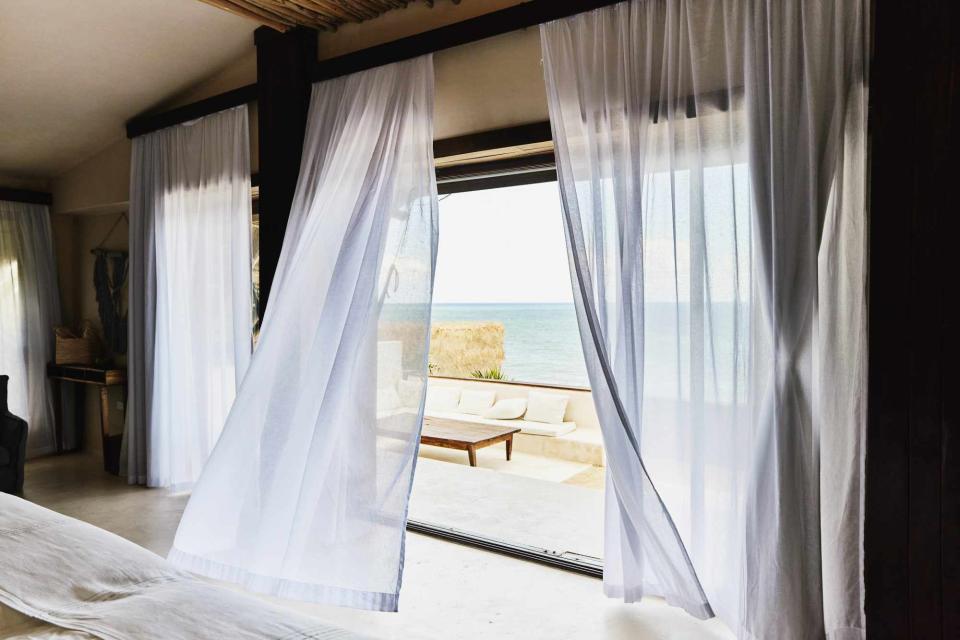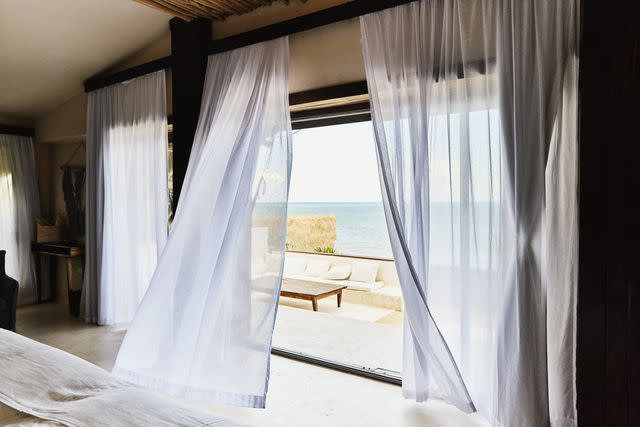How to Cool Down a Room Without AC
No air conditioning? Try these strategies to help you stay cool during a heat wave.

Staying cool can be tough when summer temperatures are scorching, and can feel almost impossible if air conditioning is not available. Extreme heat can pose some pretty serious health concerns, such as heat stroke and heat exhaustion—so keeping your cool becomes critically important.
If you need to cool off your house (or yourself), try these cooling strategies—though if temperatures rise too high, it's best to seek out an air-conditioned location, like libraries, movie theaters, and cooling stations, near you.
Related:Calming, Cooling Breathing Exercises to Try When It's Too Hot to Function

How to Keep Your House From Getting Hot
The old saying "an ounce of prevention is worth a pound of cure" definitely applies when it comes to keeping your house cool. These strategies can help you keep your house cool without air conditioning—or help reduce the amount of energy you need to keep it cool if you do have an air conditioner.
Close your drapes or blinds.
Sunlight in your home is a major source of heat—so close up those drapes.
According to energy.gov, more than three-quarters of the sunlight that hits a standard window enters the home as heat, and covering your window can help you reduce that. A set of medium-colored drapes with a plastic backing reduces heat coming in by 33%, and insulated cellular shades can reduce unwanted solar heat by up to 60%.
Keep the stove turned off.
A hot stove will (obviously) heat up your home, too. So go ahead and try some no-cook recipes that'll cool you off—and avoid adding additional heat to your kitchen.
(And if you have to cook? Consider firing up the grill instead to preserve the chill in your home.)
Turn off (and unplug) unnecessary appliances.
Dishwashers, washers, and dryers may be the biggest culprits, but even your phone chargers and small appliances can generate some heat in your home. Turn off—or better yet, unplug—anything that isn't necessary.
That means letting your hair air dry, too—a blow dryer can generate some serious heat, according to the National Resources Defense Council.
Related:23 Ways to Beat the Heat
Add some shade outside your home.
Awnings and shade trees can help block the sun from entering your windows—and keep your rooms feeling cooler. Window awnings can reduce the amount of solar heat in your house by up to 65%.
Close the doors to unused rooms.
Minimize the amount of space that needs to be kept cool by closing off any rooms that aren't currently being used.
Close gaps around your doors and windows.
You may think about weather-stripping more in the winter, when caulking and sealing around your doors and windows helps prevent uncomfortable drafts. But a few hours with a caulk gun could help keep hot air from making its way in during the summer.
It's a small change that can make a big impact. One case study found that making energy-efficient upgrades like weather-stripping could reduce the potential for heat stress from 50% in inefficient homes to just 4%.
How to Cool Down a Room Without Air Conditioning
Even with the best prevention strategies, your house will likely get hot when the temperatures rise and the sun is beating down. Fortunately, there are a few more tricks you can use to cool down your home without AC.
Open windows when the temperature drops.
Keep your windows closed during the day, when the air is hottest. But when the temperature outside is lower than the air inside, you can open your windows to create a cooling breeze indoors.
A fan placed to blow cooler air into the house will help you chill out faster, and opening windows on opposite sides of the house can create cross breezes that help cool it down faster, too.
Try opening a smaller window to let in air, and a larger window to let it out, which can increase the air speed (and make your home feel cooler), according to the National Renewable Energy Laboratory.
Exhaust out the hot air.
Running the exhaust fans in your bathroom and kitchen can help you exhaust out any heat from the shower or kitchen appliances. You can also use them in conjunction with open windows at night to help remove hot air and draw cooler air into your home.
Another cool trick? Open windows on the upper floor with a box fan blowing out, and open windows on a lower floor—the warmer air on the top floor will be ventilated out, drawing in cooler air below.
Chill the air with a DIY air conditioner.
A good breeze and something cold can help cool off the room (and if you park yourself close to it, it'll ensure that you're cooler, too). There are several strategies you could try—hang a cold, wet sheet in front of the fan; place a large bowl or bin filled with ice cubes in front of it; or attach frozen water bottles to the back of the fan.
Run a ceiling fan.
Ceiling fans are great at helping reduce the temperature—they can help a room feel 10 degrees cooler and use only 10% of the energy that a traditional air conditioner does, according to the NRDC.
Just make sure your fan is set with the blades running counterclockwise for cooling. (You'll want to set them running clockwise in the winter to help circulate warm air.)
Note, though, that a fan may make you feel more comfortable, but it doesn't help prevent heat-related illnesses, according to the CDC. Your safest bet for staying cool if the temps are getting into the high 90s? A nice cold shower or bath—or heading somewhere with air conditioning.
For more Real Simple news, make sure to sign up for our newsletter!
Read the original article on Real Simple.

